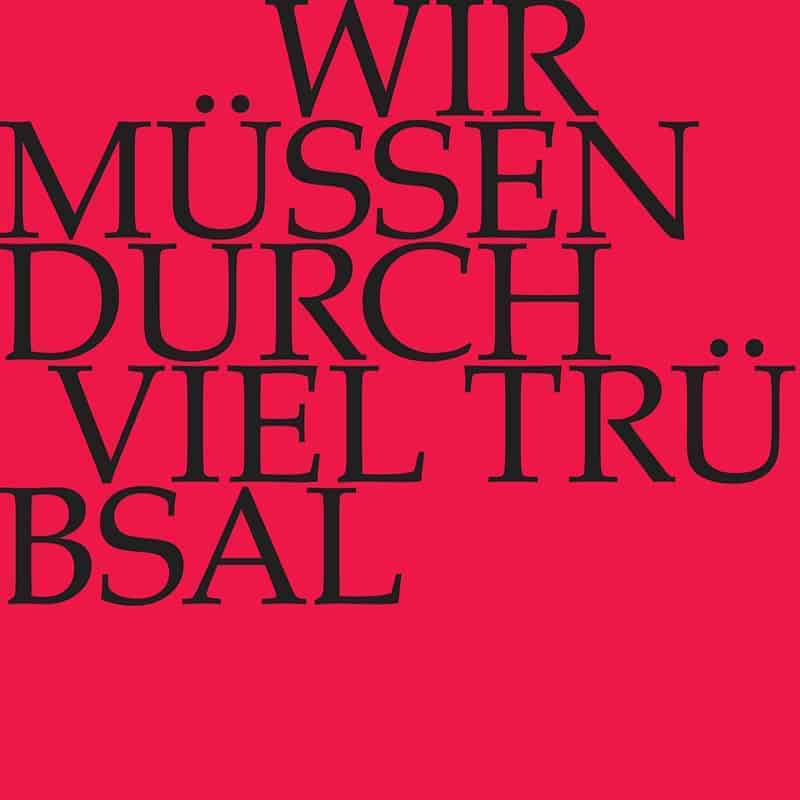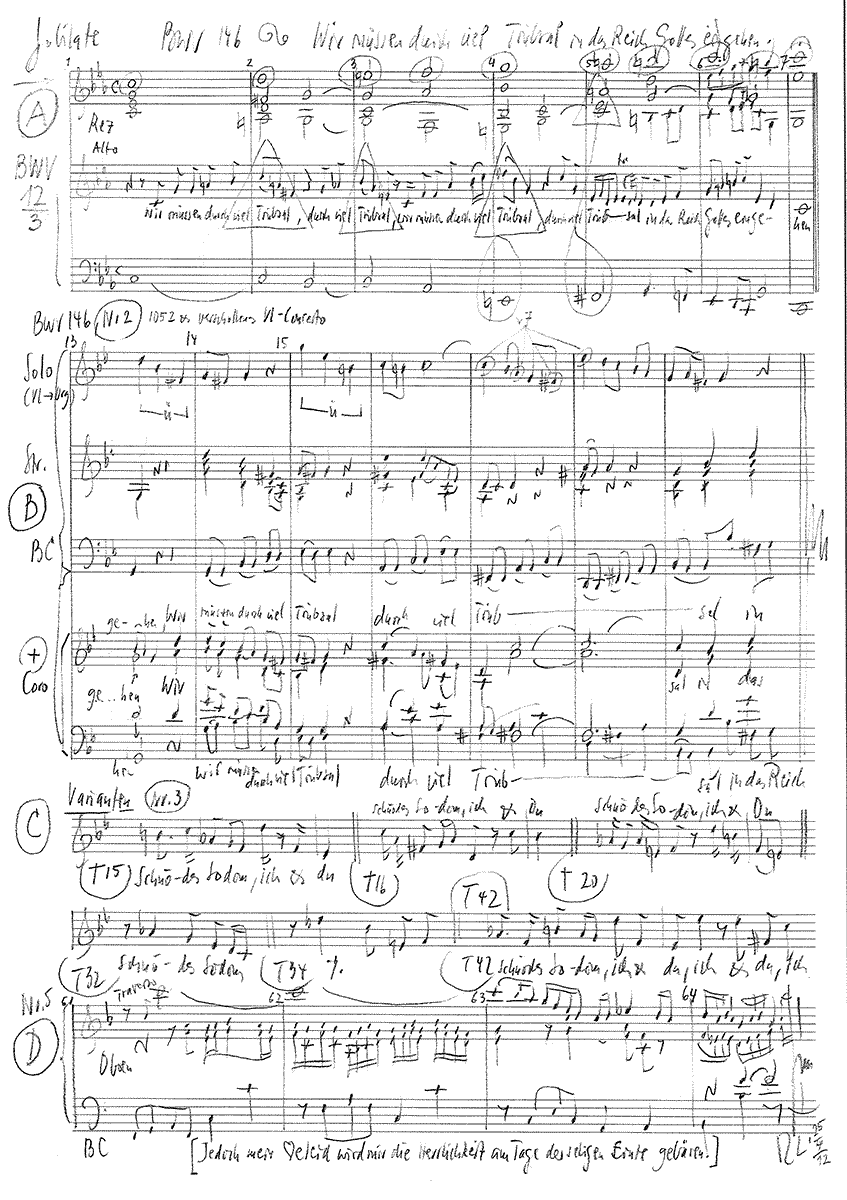Wir müssen durch viel Trübsal in das Reich Gottes eingehen
BWV 146 // For Jubilate (Third Sunday after Easter)
(We must pass through great sadness that we God’s kingdom may enter) for soprano, alto, tenor and bass, vocal ensemble, transverse flute, oboe I+II, taille, bassoon, strings and continuo

Would you like to enjoy our videos ad-free? Subscribe to YouTube Premium now...
Workshop
Reflective lecture
Choir
Soprano
Mirjam Berli, Susanne Frei, Leonie Gloor, Guro Hjemli, Alexa Vogel
Alto
Jan Börner, Olivia Fündeling, Francisca Näf, Simon Savoy, Lea Scherer
Tenor
Marcel Fässler, Clemens Flämig, Manuel Gerber, Walter Siegel
Bass
Fabrice Hayoz, Chasper Mani, Valentin Parli, Philippe Rayot
Orchestra
Conductor
Rudolf Lutz
Violin
Renate Steinmann, Dorothee Mühleisen, Monika Baer, Christine Baumann, Ildiko Sajgo, Olivia Schenkel
Viola
Susanna Hefti, Peter Barczi
Violoncello
Martin Zeller, Hristo Kouzmanov
Violone
Iris Finkbeiner
Oboe
Kerstin Kramp, Katharina Andres
Oboe da caccia
Ingo Müller
Taille
Ingo Müller
Bassoon
Susann Landert
Transverse flute
Claire Genewein
Organ
Norbert Zeilberger (Solo)
Harpsichord
Nicola Cumer
Musical director & conductor
Rudolf Lutz
Workshop
Participants
Karl Graf, Rudolf Lutz
Reflective lecture
Speaker
Miriam Meckel
Recording & editing
Recording date
04/27/2012
Recording location
Trogen
Sound engineer
Stefan Ritzenthaler
Director
Meinrad Keel
Production manager
Johannes Widmer
Production
GALLUS MEDIA AG, Switzerland
Producer
J.S. Bach Foundation of St. Gallen, Switzerland
Librettist
Text
Poet unknown
Text No. 2
Quote from Acts of the Apostles 14:22
First performance
Jubilate,
probably on 12 May 1726
In-depth analysis
Composed in 1726, BWV 146 belongs to Bach’s third Leipzig cantata cycle, in which he often wrote for an ensemble of vocal soloists and repeatedly employed the organ as an obbligato instrument. Accordingly, the opening sinfonia is an extended concerto movement that listeners will recognise as being related to the opening allegro of Bach’s harpsichord concerto BWV 1052. In this arrangement, the solo part is assigned to the organ and augmented by charming echo effects from an oboe choir. Nonetheless, it remains audible in certain sections that this concerto may have originally been conceived for violin – another instrument that Bach, a trained concertmaster, played with consummate skill. Set in the heart-rending key of D minor and featuring a rhythmic unison head motif, this movement exudes a merciless severity and dramatic stringency that are rare even in the oeuvre of the Thomas cantor.
Although it was not unusual for Bach to rework a fast concerto movement as a cantata prelude with obbligato organ, the following introductory chorus represents a bold rarity in that he also revisited the slow middle movement of the same concerto. Here, however, the descending, circling quaver figures of the original work are interwoven with a four-voice choir in which the steady march of crotchets evoke a tragic saraband, thus lending the short Bible text considerable weight. Throughout this setting, the juxtaposition of anguished vocal sighs and snappy solo keyboard riffs gives the movement a surprisingly charming groove, despite its dark tone. Whether the insistent organ part suggests the relentless course of destiny or rather gritty resolve in the face of all difficulties is a matter of personal interpretation. That the setting constitutes a compositionally daring and deeply moving expression of suffering, is, however, beyond doubt – as should be the question of the work’s authenticity, which was raised by some early scholars.
Following such wretched tones, the lighthearted B-major gesture of the alto aria evokes an act of self-liberation from abject despair. Precisely because the text speaks of a pronounced longing for heaven and thus a rejection of the “schnöden Sodom” (wicked Sodom) of daily life, the instrumental solo part in particular radiates the unwavering strength we would all desire in facing the crises of this world. The surviving sources for this movement assign the obbligato part to either organ or violin, thus we decided in favour of the violin and its powerful bow strokes.
Accompanied by strings, the soprano recitative “Ach, wer doch schon im Himmel wär” (Ah! Were I but in heaven now) continues this personal development, but this time with a grand resolve that converts the experiences of persecution and ostracism into an avowal of Jesus as the saviour. From the opening “Ach!” of this gripping setting, calm submission and willing martyrdom tread a constantly perilous – and yet comforting – fine line.
Through its memorable text and distinctive setting, the following soprano aria gives poignant expression to such proof of character under duress. The image of “mit bangem Herzen ausgesäten Zähren” (tears sown with an anxious heart) hints that fruit may yet be born of today’s sorrows, thus raising the resilient faithful to co-creators of their destiny among the elect. In this light quintet setting with its elegiac exchange between two oboes d’amore and a transverse flute, all self-righteous and boastful earthly power is thwarted by the healing strength of trusting hope. Consequently, the D minor tonality, rendered so bleak and threatening in the sinfonia, appears completely transformed.
In a spirit of time-tested confidence, the tenor recitative “Ich bin bereit” (I am prepared), radiates contagious determination and even a melodic charm. God will lay the “Krone der Gerechtigkeit” (crown of righteousness) only on the heads of those who struggled heroically on earth – a decision that audibly lends the faithful the strength to overcome all provocation and even the outward triumph of the jeering enemy.
Accordingly, the following tenor and bass duet takes on a firepower and clarity that would be reminiscent of a virtuous hero singing in a baroque opera – were it not for the more complex (albeit memorable) harmonic and melodic progression, especially in the middle section. Set in a gleaming F major, this edgy triple-time setting serves as spectacular proof that Bach, too, was capable of music that functions on multiple levels.
With all the “Trübsal” (great sadness) of the cantata opening thus dispelled, every listener can now join in the joyous singing of the closing chorale. Because the intended text is not noted in the surviving transcript of the score, we chose to use the first verse of the chorale “Freu dich sehr, o meine Seele” (Rejoice greatly, o my soul), as it complements the text of the previous duet and the opening dictum. Taken as a whole, the cantata has travelled a profound emotional journey – may it act as a beacon for our nigh-despairing world, in which nothing is needed more than a reminder that all violence and suffering are ultimately transient when we – each one of us in our place – reject brutality and resolutely foster peace in anticipation of a more perfect eternity.
Libretto
1. Sinfonia
2. Chor
»Wir müssen durch viel Trübsal in das Reich Gottes eingehen.«
3. Arie (Alt)
Ich will nach dem Himmel zu,
nach dem Himmel will ich zu,
schnödes Sodom, ich und du
sind nunmehr geschieden.
Meines Bleibens ist nicht hier,
denn ich lebe doch bei dir
nimmermehr in Frieden.
4. Rezitativ (Sopran)
Ach! wer doch schon im Himmel wär,
wie drängt mich nicht die böse Welt.
Mit Weinen steh ich auf,
mit Weinen leg ich mich zu Bette,
wie trüglich wird mir nachgestellt.
Herr! merke, schaue drauf.
Sie hassen mich, und ohne Schuld,
als wenn die Welt die Macht
mich gar zu töten hätte;
und leb ich denn mit Seufzen und Geduld,
verlassen und veracht,
so hat sie noch an meinem Leide
die größte Freude.
Mein Gott, das fällt mir schwer.
Ach! wenn ich doch,
mein Jesu, heute noch
bei dir im Himmel wär!
5. Arie (Sopran)
Ich säe meine Zähren
mit bangem Herzen aus.
Jedoch mein Herzeleid
wird mir die Herrlichkeit
am Tage der seligen Ernte gebären.
6. Rezitativ (Tenor)
Ich bin bereit,
mein Kreuz geduldig zu ertragen,
ich weiß, daß alle meine Plagen
nicht wert der Herrlichkeit,
die Gott an den erwählten Scharen
und auch an mir wird offenbaren.
Jetzt wein ich, da das Weltgetümmel
bei meinem Jammer fröhlich scheint;
bald kommt die Zeit,
da sich mein Herz erfreut
und da die Welt einst ohne Tröster weint.
Wer mit dem Feinde ringt und schlägt,
dem wird die Krone beigelegt,
denn Gott trägt keinen nicht mit Händen in den Himmel.
7. Arie (Duett Tenor, Bass)
Wie will ich mich freuen, wie will ich mich laben,
wenn alle vergängliche Trübsal vorbei.
Da glänz ich wie Sterne und leuchte wie Sonne,
da störet die himmlische, selige Wonne
kein Trauren, Heulen und Geschrei.
8. Choral
Freu dich sehr, o meine Seele,
und vergiß all Not und Qual,
weil dich nun Christus, dein Herre,
ruft aus diesem Jammertal.
Aus Trübsal und großem Leid
sollst du fahren in die Freud,
die kein Ohre hat gehöret
und in Ewigkeit auch währt.



